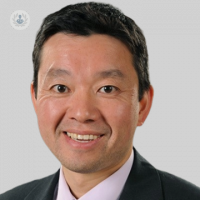A discussion on wisdom teeth management: part 2
Written by:In the second article of a two part-series, leading consultant oral and maxillofacial Surgeon Mr Geoff Chiu shares more of his expert insight on wisdom tooth management.

What options may be discussed?
There are several management options available for dealing with your wisdom teeth.
One option is observation without intervention: If your wisdom teeth are currently not causing any issues and there's a low likelihood of future problems, one approach is to simply monitor them during your regular dental check-ups. Your dentist will keep an eye on them and may take X-rays if necessary. However, it's important to understand that the situation can change over time, potentially leading to the need for treatment. Decisions about when to intervene can be made collaboratively between you and your dentist or specialist, as problems may arise without noticeable symptoms until they become severe.
Treatment
In cases where problems have arisen or there's a high risk of complications, complete or partial removal of the wisdom tooth may be recommended. During your consultation, your dentist will thoroughly discuss these options, detailing the procedures involved and any associated risks. It's also possible that upper wisdom teeth may require removal.
What does the complete removal of lower wisdom teeth involve?
If the wisdom tooth hasn't fully emerged from the gum, it often requires an incision in the gum tissue to access it. Sometimes, removing some surrounding bone is necessary as well. The tooth may need to be divided into smaller pieces for extraction. Following extraction, the gum is stitched back into place. In most cases, these stitches are absorbable and typically dissolve within about two weeks.
What are the main possible risks of removing a wisdom tooth?
Most patients typically experience full recovery without complications.
Bleeding
Minor bleeding may occur during the extraction, usually ceasing quickly and posing minimal concern. If bleeding recurs at home, applying pressure for at least 10 minutes with a rolled-up handkerchief or swab typically stops it. Persistent bleeding warrants contacting the operating department.
Alterations in chin, lower lip or togue sensations
Close proximity of two nerves to lower wisdom teeth poses a risk of bruising during extraction, potentially leading to numbness or tingling in the chin, lower lip, or tongue. The likelihood of nerve injury varies depending on proximity, with a lower risk when the wisdom tooth is distant from the nerve. Full recovery from nerve injury may take up to 18 months, though rare cases may result in permanent numbness.
Infection
Infection in the extraction socket or dissolution of the blood clot can lead to a dry socket, albeit with low incidence, around 2%. Maintaining cleanliness with water or mouthwash post-procedure, along with abstaining from smoking, helps minimize infection risk. Antibiotics may be prescribed if necessary.
Weakening of the jaw:
Although rare, significant weakening of the jaw with potential for fracture can occur post-wisdom tooth removal, with an incidence of less than 1% (less than 1 in 100).
A coronectomy
When the inferior dental nerve closely interacts with the wisdom tooth, a coronectomy may be recommended. This procedure involves removing only the upper portion of the tooth, leaving some roots intact to reduce nerve injury risk. However, there's a less than 3% chance of requiring further root removal or experiencing delayed healing. A thorough assessment during consultation determines the suitability of this option.
How long does it take to remove a wisdom tooth?
The duration varies. Some extractions may be completed in just a few minutes, while more complex cases, requiring the tooth to be sectioned for removal, may take approximately 20 minutes.
Is there much pain or swelling after the removal of wisdom teeth?
Discomfort and swelling are common both internally and externally following surgery. This discomfort typically peaks within the first three days and may persist for up to two weeks. Jaw stiffness and restricted opening are also common, requiring a soft diet for about a week. Facial bruising, if present, can take up to two weeks to subside. Applying an ice pack wrapped in a towel during the initial 24 hours can help alleviate swelling. Recovery time may be longer for older individuals undergoing wisdom tooth extraction.
What type of anaesthetic is used?
There are a number of options are available and depend on how difficult the wisdom tooth is to remove.
Local anaesthesia: Injection into the gum surrounding the wisdom tooth, akin to what's administered during dental fillings. This numbs the area, ensuring pain-free extraction.
Local anaesthesia with intravenous sedation: In addition to a local injection, a sedative injection into the arm induces relaxation and reduces awareness during the procedure. Patients are typically awake but may have minimal recollection of the operation.
General anaesthesia: Wisdom teeth can often be removed under a day-case general anaesthetic, allowing patients to return home the same day.
If you want to know more about your operation please speak to your dentist or specialist.
Here is a list of trusted websites that offer safe, sensible, useful information:
- Royal College of Surgeons of England. http://www.rcseng.ac.uk/
- British Association of Oral and Maxillofacial Surgeons. http://www.baoms.org.uk/
- British Association of Oral Surgeons. http://www.baos.org.uk
If you would like to book a consultation with Mr Chiu, do not hesitate to do so by visiting his Top Doctors profile today.


